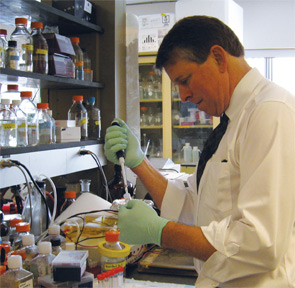
An ongoing study of key immune system proteins has pinpointed an area associated with increased risk for inflammatory disease and may one day lead to new therapies to control inflammation and rheumatic diseases.1
William F. Rigby, MD, the study’s principal investigator, is a recipient of an ACR Research and Education Foundation (REF) Within Our Reach: Finding a Cure for Rheumatoid Arthritis research grant. Both a clinical rheumatologist and a basic scientist, Dr. Rigby used his vast expertise to answer a specific clinical question in the lab.
“My laboratory has been interested in how the production of key proinflammatory proteins is regulated inside the cell,” says Dr. Rigby, professor of medicine and microbiology and immunology at Dartmouth Medical School in Hanover, N.H. “These proteins are major factors in the induction and maintenance of rheumatoid arthritis [RA] and systemic inflammation. Some of these proteins can be targeted by classical means, such as making an antibody. Others cannot.”
One of the proteins that cannot be targeted by classical means is CD154. Dr. Rigby says CD154 is an important proinflammatory molecule that has been validated as a target in multiple animal models. However, there are certain toxicities with antibody-based CD154 therapy. Therefore, developing mechanisms that block CD154 biosynthesis has been a central focus of his laboratory.
Dr. Rigby and his colleagues sought to determine if genetic polymorphisms of the CD154 gene played a role in the gene’s expression. “The thought that the expression of a key protein such as CD154 could vary from individual to individual on the basis of these polymorphisms was very interesting to us,” he says.
Previous data in this area were confusing, Dr. Rigby notes, but the Within Our Reach grant allowed his lab to develop specific systems to test which of the polymorphisms lead to increased production of the CD154 protein. At the same time, a parallel study was conducted to look at the frequency of the various polymorphisms of the CD154 gene in a large cohort of RA patients.
“We were exceptionally surprised to find that the CD154 gene was precisely regulated by genetic variation,” Dr. Rigby says. “We then found that the variants associated with increased CD154 expression were found more frequently than would be predicted by chance in the RA-positive cohort. Thus, individuals may differ in their ability to express CD154, and individuals that have genetic predisposition to expressing higher levels of CD154 are at increased risk of developing rheumatoid arthritis.”
Support RA Research
To make a pledge or a one-time donation to the REF for the Within Our Reach: Finding a Cure for Rheumatoid Arthritis campaign, visit www.rheumatology.org/REF. For more information about the Within Our Reach campaign and to read about the grant projects, visit www.WithinOurReach.info.